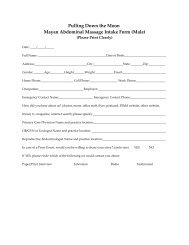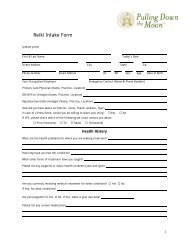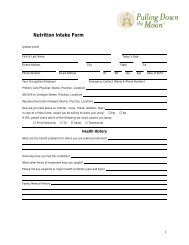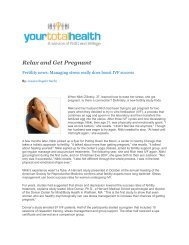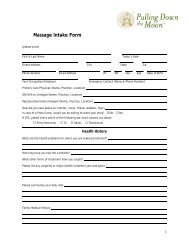Foods for Conception – How Nutrition Can Impact Fertility
Foods for Conception – How Nutrition Can Impact Fertility
Foods for Conception – How Nutrition Can Impact Fertility
- No tags were found...
You also want an ePaper? Increase the reach of your titles
YUMPU automatically turns print PDFs into web optimized ePapers that Google loves.
America’s First IVF Baby…25 Years Later… MilestonesFALL 2007Halle BerryPregnant at 41The Importance ofForgiveness andGratitude9 Tipsto boostMale <strong>Fertility</strong>Steve Granitz/WireImageTeens FirstVisit to theGynecologistDo You HaveGood <strong>Fertility</strong>Etiquette?Getting the Most out of Your GYN Visit:Pap Smears • Breast ExamContraception • Sexuality and more…U.S.A. $6.95CANADA $8.50FOREIGN $10.50<strong>How</strong> toPreserveyourMarriageFinding a<strong>Fertility</strong>Center ofExcellence
EXERCISE AND NUTRITION<strong>Foods</strong> <strong>for</strong> <strong>Conception</strong> –<strong>How</strong> <strong>Nutrition</strong> <strong>Can</strong><strong>Impact</strong> <strong>Fertility</strong>LAUREN WEISS, DC, CCNDirector of <strong>Nutrition</strong>Pulling Down the MoonIntroduction by Laurence A. Jacobs M.D.This is the third article in our series on Fitness& <strong>Fertility</strong>. The first article (<strong>Fertility</strong> TodayWinter 2007) “Fitness Misconceptions, AFitness Plan & A Big Important Fact to Improve<strong>Fertility</strong>” featured fitness misconceptionsand a fitness plan utilizing the X2Vest.(www.X2FitandFertile.com) The second article(<strong>Fertility</strong> Today Spring 2007) “Weight Loss and ConditioningImprove <strong>Fertility</strong>” outlined the negative impact ofInsulin resistance and obesity on fertility. It also focused onthe increased pregnancy complications. For women withPCOS and/or obesity, as little as a 5-10% weight loss cansignificantly increase pregnancy rates.The article below by Lauren Weiss DC, CCN (Directorof <strong>Nutrition</strong> at Pulling Down the Moon: www.Pulling-DowntheMoon.com) highlights the importance of propernutrition, in addition to weight reduction and exercise, aspart of the overall plan to improve pregnancy rates in obesewomen.<strong>Nutrition</strong> is an extremely important factor in ourhealth. In fact, without a healthy diet, it is very likely thata man or woman will be nutritionally deficient in somemanner. Without the proper nutrients, all of the body systems,including the reproductive system, will not work optimally.Although physical defects affecting fertility cannotbe assisted by diet, research is showing that when ovulation– an endocrine issue – is a culprit, as it is in 25% of infertilitycases, lifestyle can play a role in achieving pregnancy.This is because the endocrine system affects fertility, andwhat we eat plays a big role in the function of that system.<strong>How</strong>ever, if we eat well, aren’t we getting enough vitaminsand minerals through our foods alone? The answer isno. Let’s take a look at why your diet may be deficient.Without the proper nutrients,all of the body systems,including the reproductivesystem, will not workoptimally.So What Are We Eating?The Standard American Diet: AKA SADUn<strong>for</strong>tunately, the dietary habits of most Americans arevery poor. It is high in animal fats, unhealthy saturated andhydrogenated fats, low in fiber, high in processed foods,and low in complex carbohydrates and plant-based foods.Next time you go grocery shopping, take a good look atyour cart. <strong>How</strong> many of those foods are actually freshfruits and vegetables, whole grains, and lean proteins?Not All <strong>Foods</strong> Are Created EqualThe 1992 Earth Summit statistics indicate that the mineralcontent of the world's farm and range soil has decreaseddramatically during the last 100 years. In fact, inNorth America alone an estimated 85% of minerals havebeen depleted from the soil. This is because the same cropsare grown over and over again on the same soil. Nitrogenfertilizers and other chemicals blanch the soil and producelarge crops with a low nutrient value.Selenium and zinc are two minerals that could be aman’s best friend. Higher intake is associated with highersperm numbers, morphology and motility. Selenium, <strong>for</strong> example,comes from food sources such as nuts, meats, andseafood. <strong>How</strong>ever the amounts of the mineral are dependenton the selenium-rich soil that the animals feed off of.28 FERTILITY TODAY
EXERCISE AND NUTRITIONProcessing is another problem. Processed grains losetheir hulls that contain important minerals and nutrients andcooking foods at high temperatures to preserve them destroysfragile enzymes and nutrients. Think about that deliciouslyhealthy “processed” protein bar on the shelf. If youopen it up three years from now, it will taste just as deliciousas it does today. That’s scary. If it doesn’t break down on theshelf, it is not going to easily break down in your body.Post-Pill RecoveryMany women innocently go on a birth control pillthinking that when they are ready they simply go off andget pregnant. <strong>How</strong>ever, this is not necessarily the case.What many doctors and patients don’t know is that thebody is depleted of essential vitamins and minerals in orderto break down this excess hormone. Studies show that B1,B2, B3, B6, B12, folic acid, magnesium, vitamin C, Zinc andvitamin E levels are all known to decrease while on an oralcontraceptive. These nutritional deficiencies may be responsible<strong>for</strong> problems with menstruation and ovulationwhen a woman stops taking the pill.This is bad news <strong>for</strong> a nutrient called B6. Pyridoxine deficiencycauses estrogen/progesterone imbalances and increasesserum prolactin which can interfere with ovulation.Together with zinc, B6 is essential <strong>for</strong> the <strong>for</strong>mation of femalesex hormones and the proper functioning of estrogenand progesterone. A B6 deficiency can lead to a buildup ofestrogen in the system, and the ovaries respond by cuttingdown their production of progesterone, which can lead tochronic abortion and luteal phase defects.Overfed and UndernourishedWhen considering all the ways that nutrients could besneaking out of your diet, it is easy to understand how wecan eat lots of food and still not have enough. This is whyI always recommend a high quality supplement to get allyour nutrient needs <strong>for</strong> fertility. A good quality prenatal vitaminis key when trying to conceive.A Weighty IssueStudies have shown that overweight women are more likelyto have ovulation problems that result in irregular or infrequentmenstrual cycles and infertility. Obesity also increasesthe risk <strong>for</strong> ectopic pregnancies and miscarriage. With medicalfertility treatment, success rates are lower in women whoare overweight. This may be the result of a lower responserate to fertility medications and a higher percentage of immatureeggs. In fact, some physicians now require medical clearancebe<strong>for</strong>e per<strong>for</strong>ming ART procedures on any woman witha Body Mass Index (BMI ) greater than 35.Much of the adverse impact of weight on the menstrualcycle is a result of hormone imbalance. Although most of awoman's estrogen is manufactured in her ovaries, 30% isproduced in fat cells by a process that trans<strong>for</strong>ms circulatingadrenal male hormones into estrogen. Because a normalhormonal balance is essential <strong>for</strong> the process of conception,it is not surprising that extreme weight levels, either high orlow, can contribute to infertility. The good news is thatstudies show better nutrition and weight reduction throughdiet and exercise can produce considerable improvement inthe outcome of treatment <strong>for</strong> fertility in obese women.Sugar is Not That Sweet <strong>for</strong> <strong>Fertility</strong>The hormone insulin, which is often elevated in thebody of overweight women, can also act directly on theovary. Insulin’s primary role in the body is to allow thebody to store excess blood sugar in fat cells. With overweightwomen, more insulin may be produced to regulatethe higher blood sugar levels. Because insulin is chemicallysimilar to the ovarian hormones, which help the eggs mature,the ovaries confuse the elevated insulin with their owngrowth factors and down-regulate the production of reproductivehormones. There<strong>for</strong>e, eggs do not fully mature andovulation is incomplete. This is a major problem <strong>for</strong>women with polycystic ovarian syndrome (PCOS). In fact,women with PCOS respond extremely well to dietary therapy.For this reason, at Pulling Down the Moon we tailorour “fertility diet” <strong>for</strong> overweight women to not only loseweight but normalize blood sugar as well. In fact, these dietarychanges have caused women to ovulate who haven’tbeen able to naturally in years.<strong>Nutrition</strong> Tips <strong>for</strong> <strong>Fertility</strong>One of the last things women trying to conceive thinkto do is to visit a nutritionist. <strong>How</strong>ever, nutrition is extremelyimportant to our fertility. For couples struggling toget pregnant, it is important to evaluate what you are eatingand learn to incorporate foods and nutrients that canboost reproduction.Whether you are underweight, overweight, or simplycould use a nutritional boost to optimize your chances ofconception, nutrition should be an important part of yourfertility journey. Have a consultation with a nutritionist whospecializes in fertility and begin a fitness program tailored tothose trying to conceive. There are many things that we donot have control over with our fertility, however, we do havecontrol over our nutritional choices and incorporating abeneficial fitness regimen into our lifestyles. ●FALL 2007 29



